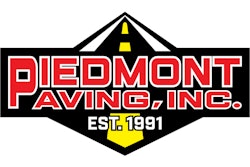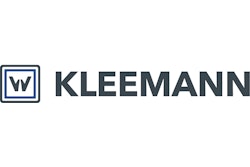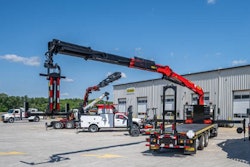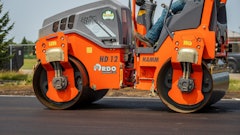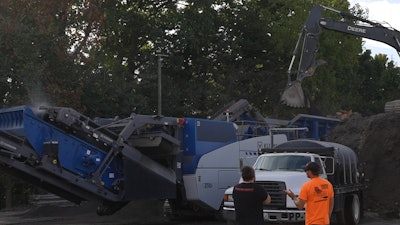
For many asphalt and pavement maintenance contractors, the piles of leftover millings, broken concrete, and truck washouts that accumulate over a season are seen as waste, a problem to be dealt with, material to be hauled away somewhere. In some areas this waste even comes with its own costs associated with dumping it. But a growing number of forward-thinking contractors are realizing that these “waste” piles can become a profit center.
Crushing reclaimed asphalt pavement (RAP) and concrete isn’t just about sustainability. It’s about creating new material streams, cutting disposal costs, and building independence from third-party aggregate suppliers. As several contractors have discovered, adding a crusher to the yard can change a company’s financial picture in surprising ways.
 Adam Rahn
Adam Rahn
A Local Paver's Crushing Success
In central North Carolina, Piedmont Paving made a move nearly six years ago that seemed risky and out of the ordinary at the time. What began as a side project on a small plot of land is now a full-scale material operation serving both their own needs, as well as other contractors who need materials or are just looking for a place to dispose of their waste.
The McGee family were the 2025 Pavement Maintenance & Reconstruction Contractor Of The Year, and making it a point to go down and visit their operations in person was a priority to myself and the magazine. The area where they do their business is a booming region for new construction, and that's largely where they've been hanging their hat since the last economic recession.
David McGee, the patriarch and architect of the Piedmont Paving team started with little more than a drag-box paver and a tri-axle, but pushed through many ups-and-downs to raise his family into the industry. Now, they're following in his footsteps, all while breaking new ground and doing things that other blacktop maintenance companies are sometimes hesitant to do.
What they demonstrated is that, even if you don't own an asphalt plant, even by itself, crushing can be profitable, efficient, and a game changer for any size paving contractor.
Matt McGee of Piedmont Paving said the decision came from seeing value where others saw waste. “My dad, David McGee, and Mark Rountree… always had people asking what we do with those millings. They wanted to buy them,” McGee explained. “They used [the millings] for driveways, paths, and other things, while most people in our industry, are trying to get rid of them."
Rather than giving away RAP to local plants or paying to dispose of concrete, Piedmont decided to start processing it themselves. They had the foresight to see how they could disrupt the business-as-usual way most pavement crews deal with their waste, combined with the conditions allotted to them in their area, and decided to turn those conditions into a formula for greater success and greater profits.
“We started just feeding ourselves,” McGee said. “Instead of taking it to the asphalt plant, where we don’t get anything for it in return, we ended up acquiring this property, and it’s grown exponentially since we started." Brandon Noel
Brandon Noel
The operation now handles about 5,000 to 6,000 tons at a time. “We don't charge for it, everybody dumps for free,” McGee said. “If it’s clean asphalt or clean concrete, we'll take it.”
That free dumping policy ensures a steady flow of inbound material. Even in a less dense areas like those of North Carolina, where space doesn't come at the sorts of premiums it does in urban parts of the country, contractors are still looking for places to get rid of their leftover materials. That includes asphalt RAP, and the extra few yards of concrete that rolls around in the trucks at the end of the day.
“We have two concrete companies that come and wash out all their trucks every day, so we’re getting ten, twenty, thirty yards a day of concrete washout,” he added.
Each load that comes in becomes fresh inventory. The crushed product, which includes asphalt down to, “five-eighths minus, by the size of your thumbnail,” McGee said, is sold for driveways, road projects, and even other asphalt plants call them up.
“Other contractors will buy the crushed concrete because it’s just as good as stone,” McGee said. “It takes more water to set up, but once you set it, I think it sets up better than stone.”
From Side Hustle to Self-Sustaining Enterprise
The company’s first customers were other paving plants that needed clean RAP. “We ended up actually selling it for the first two-or-three years to a paving plant out in the boonies that were having trouble getting RAP,” McGee recalled. “They would send ten trucks on the weekends, and we’d have somebody load them out, and they would buy every single lick of it."
Once the word spread, Piedmont didn’t have to market much. For a while, McGee experimented with Facebook Marketplace. It turned out to be almost too successful, with orders of all sizes coming in faster than they could handle them.
“When I tell you I could not keep up with the orders and the messages,” he said, “I had to shut that down." Today, the operation sells itself, with multiple trucking companies picking up and reselling crushed material.
“We just load them and charge them,” McGee said.
The company’s investment in crushing equipment also paid off in terms of efficiency. “It’s a German-engineered machine. It’s like a Swiss watch,” McGee said, describing their Kleeman impact crusher. “It’s electrical over hydraulic… there’s a magnet that gets out any metals… and anything that’s too big gets filtered back through on the bottom conveyor to go through one more time to make sure it gets crushed all the way." Adam Rahn
Adam Rahn
All of this runs with a minimal crew. “I only see the two guys here,” Brandon noted in the interview. McGee confirmed, “That runs the whole operation… three days, and they’ll be done crushing this”. Despite the lean setup, the company can’t keep product in stock. “Even that pile right there that’s not crushed yet is already sold,” McGee said. “We can’t keep it in stock."
I saw this for myself when I was on site. In just the span of one hour, a half dozen concrete trucks arrives to washout, and several large mountains of rap were pulverized efficiently by a two person team. Part of what made it so easy, was the fact that this particular Kleeman crusher was equipped with remote control movement. This enabled the Piedmont team member loading the crusher with an excavator could reposition the crusher as needed, without the need of a third crewman.
The Broader Case for Crushing
The experience at Piedmont echoes what equipment manufacturers and producers are seeing across the asphalt industry.
Daniel Friedman, VP marketing from leading crusher manufacturer Eagle Crusher explained in a Q&A that, “Having on-site crushing capabilities allows asphalt contractors the opportunity to both save money by recycling RAP as well as introduce new revenue streams by accepting RAP from third parties… and, if the business case supports it, charge to accept the materials."
For paving contractors, this can mean transforming waste into wealth. Instead of paying fees or hauling off-site, every ton of crushed asphalt or concrete becomes inventory, usable base material for your own projects, or sellable aggregate. Beyond savings, there’s independence.
“Crushing on-site means that your operation isn’t beholden to contract crushing operations or third-party suppliers for your RAP," Friedman said.
That control over supply can be critical when market volatility, trucking shortages, or high aggregate demand cause prices to spike. For higher-volume operations, the return on investment can come quickly.
“Higher-volume asphalt plants can easily see their RAP crushing system investment recouped within a single paving season," they said.
That kind of turnaround is rare for capital equipment, and it speaks to the high demand for RAP and crushed concrete in today’s roadbuilding market.
Mobile, Modular, and Multi-Purpose
Another major advantage is the flexibility. While mobile/portable crushing equipment usually isn’t directly tied into a HMA production system, well thought out plant layouts or crushing operations like Piedmont's can mean minimal effort to feed RAP bins for asphalt production.  Adam Rahn
Adam Rahn
With that modularity also creates opportunities beyond asphalt. "When an asphalt plant utilizes mobile or portable crushers to process RAP for their own mix, if there is downtime, the crushers can be sent offsite to crush other materials," Friedman explained. This can open a new business line and increase revenues.
For contractors who already manage milling, trucking, and site prep, this is a logical extension of their capabilities. Crushed material is always in demand.
McGee put it plainly, “They just come wash out. It’s just money in the bank”.
Sustainability That Pays
While sustainability goals often drive recycling discussions, the business case is just as strong. Reusing concrete washouts, accepting millings from other contractors, and turning discarded material into a sellable product reduce landfill waste while improving community relations and meeting regulatory expectations. But for most contractors, the math is what seals the deal.
Every truckload that used to cost money to dump now generates revenue. Every crushed ton reduces the need to buy virgin aggregate. And every cubic yard of clean material reused on a jobsite shortens haul times, reduces fuel costs, and keeps crews working.
As the asphalt and pavement maintenance industries continue to navigate rising material prices and tightening environmental standards, the contractors who crush will be the ones who come out ahead, not just in sustainability reports, but on the balance sheet.





